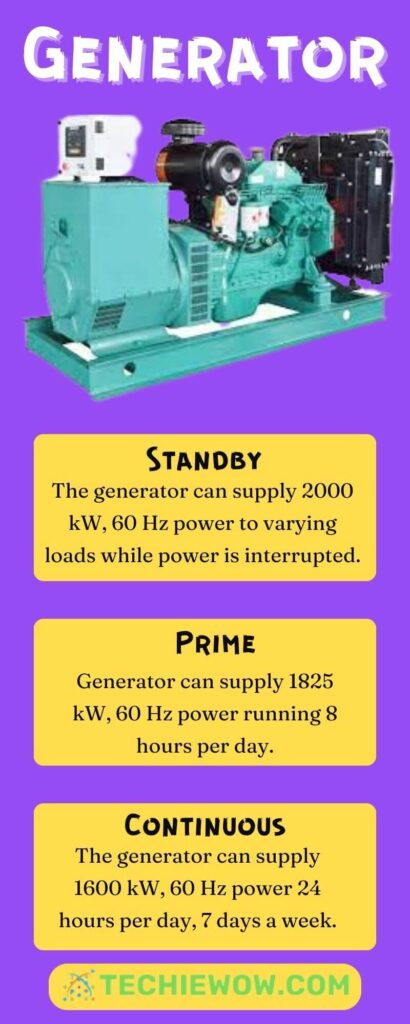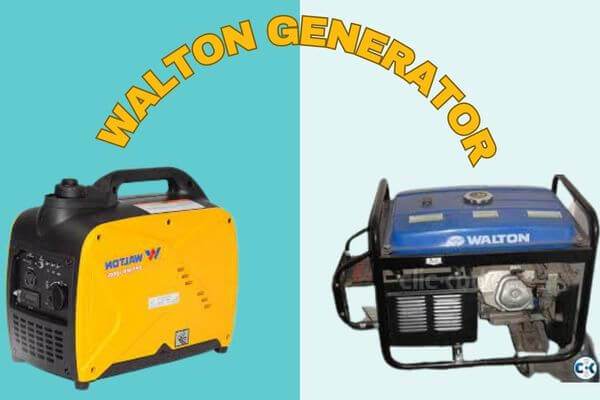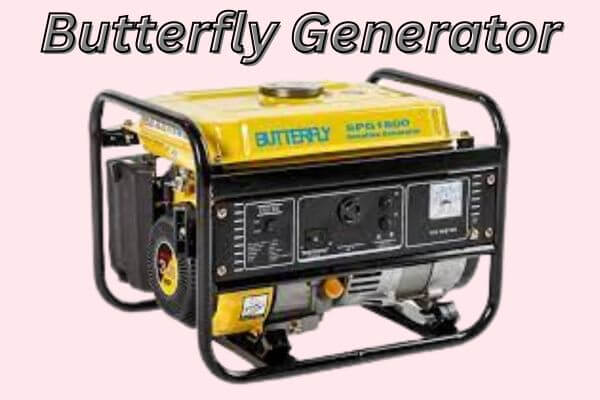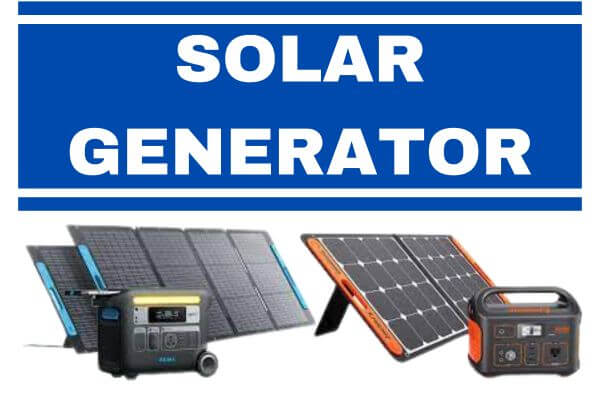Generator Price in Bangladesh If it is your search welcome to our blog. Where we delve into the fascinating world of power generation and explore the current landscape of generator price in Bangladesh. As an integral part of the nation’s energy infrastructure, generators play a crucial role in mitigating power shortages, ensuring uninterrupted electricity supply, and empowering industries, businesses, and households across the country.
In this article, we will take a closer look at the factors that influence generator prices in Bangladesh, and the different types of generators available in the market, and provide insights into the current pricing trends. Whether you’re a homeowner looking for backup power solutions or a business owner planning to invest in a reliable generator, this guide will help you navigate the diverse range of options and make informed decisions.

Generator
Generators are devices that convert mechanical energy into electrical energy. They serve as a reliable source of backup power during electricity outages or in areas where grid power is inaccessible. Generators are widely used in various settings, including homes, businesses, industries, construction sites, and outdoor events.
Here are some key aspects to know about generators
Types of Generators
Portable Generators: These generators are compact, lightweight, and designed for easy transportability. They are commonly used for outdoor activities, camping trips, and as temporary backup power solutions.
Standby Generators: Installed permanently, standby generators automatically activate when there is a power outage. They are typically connected to the electrical system of a building or facility and can provide continuous power for extended durations.
Inverter Generators: These generators produce high-quality power with consistent voltage and frequency. They are known for their fuel efficiency, quiet operation, and suitability for sensitive electronic devices.
Diesel Generators: Diesel generators are popular due to their durability, high power output, and fuel efficiency. They are commonly used in industrial settings, construction sites, and as backup power for large establishments.
Gasoline Generators: Gasoline generators are affordable and widely available. They are commonly used for smaller power needs such as in homes, small businesses, and outdoor recreational activities.
Natural Gas Generators: These generators utilize natural gas as fuel and are often connected to a natural gas pipeline. They are known for their clean operation, low emissions, and continuous power supply.
Power Capacity
Generator power capacity is measured in watts or kilowatts (kW). It determines the amount of electrical load the generator can handle. When selecting a generator, it’s essential to consider your power requirements and ensure the generator’s capacity meets or exceeds those needs.
Fuel Types
Generators can be powered by various fuels, including diesel, gasoline, natural gas, propane, and even solar energy. The choice of fuel depends on factors such as availability, cost, environmental considerations, and specific requirements.
Maintenance and Safety
Proper maintenance is crucial for the efficient and safe operation of generators. Regular servicing, fuel management, and adherence to safety protocols are essential to ensure optimal performance and prevent accidents or equipment damage.
Noise and Emissions
Some generators produce noise and emissions during operation. However, advancements in generator technology have led to the development of quieter and more environmentally friendly models. It’s important to consider noise and emissions regulations, especially in residential areas or settings with strict environmental standards.
Budget Considerations
Generator prices vary based on factors such as power capacity, brand, features, and fuel type. It’s important to determine your budget and conduct research to find a generator that offers the right balance between affordability and reliability.
Remember, before purchasing a generator, it’s advisable to consult with professionals or experts in the field to ensure you select the most suitable generator for your specific requirements.
Generator All Parts Name
Generators consist of several essential parts that work together to generate electricity. Here are the names of some key generator parts:
Engine
The engine is the core component of the generator and is responsible for converting fuel into mechanical energy. It drives the generator’s rotor or armature.
Alternator
Also known as the generator head, the alternator converts the mechanical energy from the engine into electrical energy. It consists of a rotor (field winding) and a stator (armature winding) that generate an alternating current (AC).
Fuel System
The fuel system comprises various components that store, deliver and supply fuel to the generator engine. It includes the fuel tank, fuel pump, fuel filters, and fuel injectors or carburetors, depending on the type of generator.
Voltage Regulator
The voltage regulator regulates and stabilizes the voltage output of the generator. It ensures a consistent and safe electrical output by controlling the field current in the alternator.
Control Panel
The control panel contains various switches, meters, and indicators to monitor and control the generator’s operation. It typically includes an on/off switch, circuit breakers, voltage and frequency meters, and indicator lights.
Battery
Many generators have a battery that is used for starting the engine and providing power to the generator’s control panel and electric start system.
Cooling System
Generators require a cooling system to prevent the engine from overheating during operation. It typically consists of a radiator, cooling fan, coolant, and associated hoses.
Exhaust System
The exhaust system directs the combustion gases produced by the engine out of the generator. It includes the exhaust manifold, muffler, and exhaust pipes.
Lubrication System
The lubrication system ensures proper lubrication of the engine’s moving parts to reduce friction and extend the engine’s lifespan. It includes the oil pump, oil filter, and oil reservoir.
Governor
The governor regulates the engine’s speed and controls the fuel supply to maintain a stable and consistent output frequency.
Frame and Enclosure
The frame provides structural support and protection to the generator’s components. Some generators also come with an enclosure or housing to reduce noise and protect the generator from the elements.
Control Cables and Wiring
These include the electrical cables and wiring that connect the generator’s components, such as the battery, control panel, and voltage regulator.
It’s important to note that generator designs and configurations may vary depending on the type, brand, and capacity of the generator. The specific names and configurations of parts may differ slightly between different models and manufacturers.
Generator Battery: Powering Reliability and Convenience
The generator battery plays a vital role in ensuring the reliable operation of generators. It serves as the primary power source for starting the generator’s engine, providing the necessary electrical energy to initiate the combustion process. Additionally, generator batteries can also serve as a backup power supply for essential electronics during power outages. In this article, we will explore the significance of generator batteries, their types, maintenance requirements, and their role in powering generators.
The Role of the Generator Battery
The generator battery serves a critical function in starting the engine. When the generator is not in use, the battery stores electrical energy that is later used to power the ignition system. When the generator’s start switch is engaged, the battery supplies the necessary electrical current to the starter motor, enabling it to crank the engine and initiate combustion. Once the engine is running, the generator’s alternator takes over and recharges the battery while simultaneously providing electrical power.
Electric Start Systems: Convenience and Ease of Use
Many modern generators are equipped with electric start systems, which rely on a battery to start the engine with the push of a button. This feature offers convenience and ease of use, eliminating the need for manual recoil starting. Electric start systems are particularly beneficial for individuals who may have difficulty with manual starting methods, providing a hassle-free solution to initiate generator operation.
Battery Types for Generators: Lead-Acid vs. Lithium-Ion
The two most common types of batteries used in generators are lead-acid batteries and lithium-ion batteries. Lead-acid batteries are traditional and widely used, known for their affordability and reliability. They come in different variations, including maintenance-free and deep-cycle batteries, depending on specific generator requirements. Lithium-ion batteries, on the other hand, are relatively newer to the generator market. They offer several advantages such as lighter weight, longer lifespan, faster recharging times, and higher energy density. However, lithium-ion batteries tend to be more expensive than lead-acid batteries.
Battery Maintenance: Ensuring Optimal Performance
Proper maintenance is crucial to ensure the longevity and optimal performance of generator batteries. Regular inspection of battery terminals for corrosion, cleaning, and tightening of connections is essential. Checking the battery’s electrolyte levels (for lead-acid batteries) and maintaining the appropriate charge are important to prevent damage and maximize the battery’s lifespan. Following the manufacturer’s guidelines and recommendations for battery maintenance is highly recommended.
Battery Capacity: Choosing the Right Size for Your Generator:
Selecting the appropriate battery capacity for your generator is essential. The battery capacity, typically measured in ampere-hours (Ah), determines the amount of electrical energy the battery can store. It should be sufficient to meet the power requirements for starting the generator and potentially powering essential electronics during outages. It’s important to consider the power demands of your generator and the intended usage when choosing the battery capacity.
Charging the Battery: Methods and Considerations
Generator batteries require regular charging to maintain their charge levels and ensure readiness when needed. The most common method of charging generator batteries is through the generator’s built-in alternator or charging system. The alternator replenishes the battery’s charge while the generator is running. Some generators also have the option for external charging using a battery charger. It’s crucial to follow the manufacturer’s instructions for proper charging procedures and avoid overcharging, which can damage the battery.
Battery Lifespan and Replacement: When to Replace the Generator Battery
Generator batteries have a limited lifespan and will eventually require replacement. The lifespan of a battery can vary based on factors such as battery type, usage patterns, maintenance, and environmental conditions. Monitoring the battery’s performance, including its ability to hold a charge and provide sufficient starting power, is important. If the battery shows signs of deterioration, such as reduced capacity or difficulty.
Generator Motor
A generator motor, also known as an electric generator or dynamo, is a device that converts mechanical energy into electrical energy. It operates on the principle of electromagnetic induction, discovered by Michael Faraday in the 19th century.
The generator motor consists of two main components: a rotor and a stator. The rotor is the rotating part of the motor, usually driven by an external power source such as an engine or a turbine. The stator is the stationary part of the motor and houses the winding system.
When the rotor is rotated, it creates a changing magnetic field. This changing magnetic field induces an electrical current in the windings of the stator, according to Faraday’s law of electromagnetic induction. The stator windings are connected to an external circuit, allowing the generated electrical energy to be utilized.
The amount of electrical energy generated by the motor depends on several factors, including the speed of the rotor, the strength of the magnetic field, and the design of the generator. The electrical output is typically in the form of alternating current (AC), although some generators can produce direct current (DC) as well.
Generator motors are widely used in various applications where portable or backup power is needed. They are commonly used in homes, businesses, construction sites, and as emergency power sources. They can be fueled by gasoline, diesel, natural gas, or other fuels, or they can be driven by renewable energy sources such as wind or water turbines.
Generator motors play a crucial role in providing electrical power in situations where a stable and reliable power supply is required.
Generator Machine
A generator machine, also known as an electric generator or simply a generator, is a device that converts mechanical energy into electrical energy. It operates on the principle of electromagnetic induction, which was discovered by Michael Faraday in the 19th century.
A generator machine consists of two main components: a rotor and a stator. The rotor is the rotating part of the machine, usually driven by an external power source such as an engine, turbine, or even a hand crank. The stator is the stationary part of the machine and contains a set of conductive windings.
When the rotor rotates, it creates a changing magnetic field. This changing magnetic field induces an electrical current in the windings of the stator, according to Faraday’s law of electromagnetic induction. The stator windings are connected to an external circuit, allowing the generated electrical energy to be utilized.
The output of a generator machine is typically in the form of alternating current (AC), although some generators can produce direct current (DC) as well. The electrical output can vary in voltage and frequency, depending on the design and intended application of the generator.
Generator machines are widely used in various settings to provide electrical power. They are commonly used in homes and businesses as backup power sources during blackouts or in areas without access to a stable electricity grid. Generators are also employed in construction sites, outdoor events, and remote locations where a temporary or portable power supply is needed.
The choice of generator machine depends on factors such as power output requirements, fuel type (gasoline, diesel, natural gas, etc.), portability, noise level, and efficiency. It is essential to properly size a generator based on the electrical load it needs to support to ensure reliable operation and prevent overloading.
Generator Air Filter
A generator air filter is an essential component of a generator’s engine system. It is designed to remove airborne particles, such as dust, dirt, pollen, and other contaminants, from the incoming air before it enters the engine. It helps ensure that clean air is supplied to the combustion chamber, protecting the engine from damage and maintaining its optimal performance.
The primary function of a generator air filter is to prevent the entry of abrasive particles into the engine. When the generator operates, it draws in air through the intake system. Without an air filter, these particles could enter the engine and cause abrasion, leading to increased wear and tear on engine components such as cylinders, pistons, and piston rings. This could result in reduced engine efficiency, decreased power output, and potentially even engine failure.
The air filter typically consists of a filter element, which is made of a porous material designed to trap and retain airborne particles while allowing a sufficient amount of clean air to pass through. The filter element may be made of paper, foam, cotton, or synthetic materials, depending on the specific design and requirements of the generator.
Regular maintenance and replacement of the air filter are crucial to ensure proper engine performance and longevity. The filter can become clogged with trapped particles, reducing the airflow and compromising the engine’s efficiency. Therefore, it is recommended to follow the manufacturer’s guidelines for cleaning or replacing the air filter at the recommended intervals.
In dusty or harsh environments, the air filter may require more frequent inspection and cleaning or replacement. If the generator is operating in an area with high levels of airborne contaminants, such as construction sites or industrial settings, it may be necessary to use specialized or heavy-duty air filters to provide enhanced filtration and protection.
Generator Room
A generator room is a designated space or enclosure specifically designed to house a generator or a set of generators. It serves as a dedicated area to safely operate and maintain the generator equipment while providing adequate ventilation, noise control, and protection from environmental factors.
Here are some key aspects typically considered when designing a generator room:
Location and Space
The generator room is typically located in a well-ventilated area, away from occupied spaces to minimize noise and exhaust fumes. Sufficient space is allocated to accommodate the generator(s), fuel storage, control panels, and other necessary equipment. The room should also have enough space for personnel to perform maintenance and service tasks.
Ventilation
Adequate ventilation is crucial to remove exhaust gases, dissipate heat, and ensure a sufficient air supply for combustion. The room may include exhaust fans, louvers, or dedicated ventilation systems to facilitate air circulation and maintain a suitable environment for the generator.
Soundproofing
Generators can generate significant noise levels during operation. To minimize noise pollution and ensure a comfortable working environment, generator rooms are often soundproofed with insulation materials, noise barriers, or acoustic enclosures. This helps reduce the noise transmitted to the surrounding areas.
Fire Safety
Generator rooms should adhere to fire safety regulations and incorporate appropriate fire prevention measures. This may include fire-resistant construction materials, fire suppression systems (such as sprinklers), and proper ventilation to prevent the buildup of flammable gases.
Fuel Storage and Safety
If the generator runs on a fuel source such as diesel or natural gas, the room should include provisions for safe fuel storage. Fuel tanks or connections to an external fuel source should be properly installed and comply with applicable safety standards and regulations.
Access and Security
Generator rooms should have secure access controls to prevent unauthorized entry and protect the equipment from tampering or theft. It is common to have locked doors, security systems, and surveillance cameras in place.
Electrical Connections and Distribution
The generator room is equipped with electrical connections and distribution systems to efficiently transfer power from the generator to the desired locations. This includes circuit breakers, transfer switches, wiring, and proper grounding.
It is important to consult with professionals, such as engineers or electricians, when designing a generator room to ensure compliance with local building codes, safety regulations, and industry best practices. Proper design and construction of the generator room contribute to the safe and reliable operation of the generator equipment and the overall power system.
Factors Influencing Generator Prices
Several key factors contribute to the Generator Price in Bangladesh. Firstly, the power capacity of the generator significantly affects its cost. Generators with higher power output capabilities will generally be more expensive than their lower-capacity counterparts. Other factors that influence prices include brand reputation, fuel type, engine quality, durability, and additional features such as automatic transfer switches, noise reduction technology, and fuel efficiency.
Current Pricing Trends
In recent years, Generator Price in Bangladesh has witnessed dynamic pricing trends influenced by factors such as fluctuations in fuel costs, technological advancements, and market competition. Additionally, changes in government policies and regulations can also impact generator prices. By staying updated on the latest pricing trends, potential buyers can make informed decisions and secure the best value for their investment.
Generator Price in Bangladesh
In recent years, Generator Price in Bangladesh has witnessed dynamic pricing trends influenced by factors such as fluctuations in fuel costs, technological advancements, and market competition. Additionally, changes in government policies and regulations can also impact generator prices. By staying updated on the latest pricing trends, potential buyers can make informed decisions and secure the best value for their investment.
Here is the list of Generator Price in Bangladesh below
Walton Generator Price in Bangladesh

| Model | Operating time | Price |
| DYNAMIC 11500E | 10 hours continuous at rated load | 1,85,000 Taka |
| Booster 8000E | 8 hours at rated load | 75,000 Taka |
| Igniter 5500E | 8 hours continuous at rated load | 65,00 Taka |
| Zoom 1200 | 4 hours at rated load. | 17,500 Taka |
| Smart Power Plus 1500 | 6 hours at rated load. | 23,000 Taka |
| Proton 900 | 4 Hours Continuously at rated load | 15,000 Taka |
| Smart Power Plus 1500E | 6 hours at rated load. | 29,900 Taka |
| Superia 6000 | 6 hours at rated load | 43,500 Taka |
| Excel Smart 2200 | 6 hours at rated load. | 25,000 Taka |
| Excel Smart 2200E | 6 hours at rated load. | 31,500 Taka |
| Power Max 3600 | 6 hours at rated load. | 39,000 Taka |
| Power Max 3600E | 6 hours at rated load. | 47,000 Taka |
| Megatron 7000E | 8 hours continuous at rated load | 55,000 Taka |
| Impulse 1200 | 4 Hours Continuously at rated load | 23,500 Taka |
| Proxima 2200E | 6 hours continuous at rated load | 40,500 Taka |
| Proxima 2200 | 6 hours continuous at rated load | 33,500 Taka |
Butterfly Generator Price in Bangladesh

| Model | Price |
| SPG 1500 L | 11,210 Taka |
| SPG 2500E2 | 21,395 Taka |
| SPG 3000E2 | 23,475 Taka |
| SNG 4500 | 40,735 Taka |
| SNG 4500 | 32,625 Taka |
| SNG 5000 | 35,640 Taka |
| SNG 6500 | 37,720 Taka |
| SPG 8500E2 | 47,625 Taka |
| SPG 5000E2 | 40,940 Taka |
| SPG 3000E2 | 23,460 Taka |
| SPG 2500E2 | 21,390 Taka |
| SNG 6500 | 38,325 Taka |
| SNG 5000 | 36,255 Taka |
| SNG 4500 | 33,150 Taka |
| SPG 1500 L | 12,380 Taka |
| SPG 1500 L | 11,460 Taka |
| SPG 2500E2 | 21,780 Taka |
| SPG 3000E2 | 23,850 Taka |
| SPG 5000E2 | 41,430 Taka |
| SPG 6500E2 | 44,765 Taka |
| SPG 8500E2 | 47,625 Taka |
| SNG 4500 | 33,150 Taka |
| 3900W | 36,255 Taka |
| 5000W/50Hz, Recoil | 38,325 Taka |
Solar Generator Price in Bangladesh

| Brand | Price |
| Grecell | 96,019 Taka |
| Upusa | 20,189 Taka |
| Bluetti | 1,18,423 Taka |
| Jackery | 1,15,884 Taka |
| Powkey | 63,246 Taka |
| Hitofish | 64,789 Taka |
| Wetown | 72,919 Taka |
| Pick Ur Needs | 16,369 Taka |
| Ef Ecoflow | 2,70,739 Taka |
| Epyz | 33,925 Taka |
| Sr Portables | 3,54,078 Taka |
| Anker | 3,03.784 Taka |
| Allpowers | 1,54,819 Taka |
| Vtoman | 4,51,239 Taka |
| Sinkeu | 67,425 Taka |
| Panana | 83,413 Taka |
| Himalayan Power | 2,00,620 Taka |
| Acopower | 28,343 Taka |
| Sarrvad | 3,57,779 Taka |
| 3 Idea Imagine Create Print | 2,02,613 Taka |
| Enelong | 1,45,499 Taka |
| Loom Tree | 11,328 Taka |
| Ef Ecoflow | 1,49,349 Taka |
| Socialme | 355,274 Taka |
| Generic | 55,395 Taka |
| Shanrya | 20,827 Taka |
| Flawish | 13,443 Taka |
| Merishopp | 12,716 Taka |
| Kh | 14.658 Taka |
| Xlnt | 8,62,767 Taka |
| Pgsa 2 Z | 5,303 Taka |
| Curlin | 29,259 Taka |
| Kohler | 8,97,071 Taka |
| Ubersweet | 25,085 Taka |
| Merishopp | 11,195 Taka |
| Indydukaan Shopping At Your Figertips | 19,558 Taka |
| Anbau | 10,785 Taka |
| Topincn | 1,33,850 Taka |
| Himalayan Power Machine | 6,50,393 Taka |
| Himalayan Power Machine Mfg Co | 7,84,833 Taka |
| Himalayan Power | 1,35,085 Taka |
Sakura Generator Price in Bangladesh

| Model | Price |
| Storm LG2800E-DF | 46,000 Taka |
| LG2800E | 36,000 Taka |
| LG2700EX | 35,000 Taka |
| Storm LG2700EX-DF | 45,000 Taka |
| LG2700EX-AT | 45,000 Taka |
| SG4500i-A | 90,000 Taka |
| LG6500EX-ATS | 72,000 Taka |
| SG6500i-A(Dual Fuel) | 1,30,000 Taka |
| HG6700EX | 1,20,000 Taka |
| W200E | 1,05,000 Taka |
| LG7500EX | 67,000 Taka |
| LG75000EX-DF | 77,000 Taka |
| LG7500EX-ATS | 77,000 Taka |
| STORM D8000E | 78,000 Taka |
| LG95000EX-DF | 88,000 Taka |
| Storm D8000E-DF | 88,000 Taka |
| STORM D9000E | 88,000 Taka |
| D95E-ATS | 1,10,000 Taka |
| SG12800EX-AT | 2,40,000 Taka |
| HG12700EX | 3,50,000 Taka |
| HG12700EX-AT | 3,75,000 Taka |
| LG15000EX-AT | 3,10,000 Taka |
| HG15000EX | 400,000 Taka |
| STORM D20TF-ATS | 7,50,000 Taka |
| STORM D30TF-ATS | 9,50,000 Taka |
| HG2900EX | 65,000 Taka |
| LG6500EX | 62,000 Taka |
| LG6500EX-DF | 72,000 Taka |
| HG7700EX | 1,30,000 Taka |
| LG9500EX | 70,000 Taka |
| HG6700S-ATS | 1,65,000 Taka |
| STORM D8000R | 65,000 Taka |
| STORM D8000ES | 95,000 Taka |
| SG8500i | 1,50,000 Taka |
| SG8500i-A | 1,65,000 Taka |
| SG12800EX | 2,20,000 Taka |
| SG8500i-A(Dual Fuel) | 1,85,000 Taka |
| WDG5000S | 80,000 Taka |
An Overview of Bangladeshi Prices
We strive to provide accurate and up-to-date information about the Generator, including its price in Bangladesh. Our dedicated team gathers information from various online sources to ensure the reliability of the data. In the event of any inaccuracies, we sincerely apologize and suggest that you do your own research and comparisons before making a final purchase decision.
Related Post:
Washing Machine Price in Bangladesh
Refrigerator Price in Bangladesh
Best Deep Freezer Price in Bangladesh
FAQ
A generator refers to a device or system that produces or generates something. It can be a physical machine, such as a power generator that converts mechanical energy into electrical energy, or it can be a software program that generates code, text, or other digital content.
The working principle of a generator depends on its specific type. In the case of a power generator, it typically involves rotating a coil of wire inside a magnetic field, which induces an electric current in the wire. This current is then collected and utilized as electrical energy. Software generators, on the other hand, utilize algorithms and predefined rules to generate content based on given input or parameters.
Generators find applications in numerous fields and industries. Some examples include:
Power generation: Generators are used to produce electricity in various settings, such as residential, commercial, and industrial buildings, construction sites, and remote locations.
Content generation: Text and image generators are employed in content creation, advertising, marketing, and creative industries to automate the generation of textual content, product descriptions, social media posts, and more.
Software development: Code generators can assist programmers in generating repetitive or boilerplate code, saving time and effort.
Data generation: Generators can create synthetic data for testing and simulation purposes, such as generating datasets for machine learning algorithms or simulating real-world scenarios.
Like any technology, generators can be misused or employed for unethical purposes. For example, text generators could be used to create deceptive or misleading information, spam content, or automated propaganda. It is important to exercise responsible use and ensure that generators are utilized within legal and ethical boundaries to avoid potential harm or misuse.
Conclusion
As the demand for reliable power solutions continues to grow in Bangladesh, understanding the intricacies of Generator Price in Bangladesh becomes increasingly essential. By examining the factors that influence generator prices, exploring the available types, and monitoring the current pricing trends, individuals and businesses can make well-informed choices when purchasing a generator that suits their specific needs.




